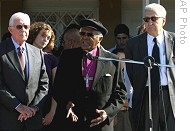VOA标准英语10月-'Elders' Visit Cyprus to Support Talks Between Gr(在线收听)
 |
| From left: Jimmy Carter, Archbishop Desmond Tutu, former Algerian Foreign Minister Lakhdar Brahimi in Nicosia, 08 Oct 2008 |
President Carter, South African Archbishop Desmond Tutu, and former Algerian Foreign Minister Lakhdar Brahimi are here to urge greater international recognition of recent progress towards a lasting settlement in Cyprus.
On arrival, they lauded Cyprus President Dimitris Christofias and Turkish Cypriot leader Mehmet Ali Talat for their expressed commitment to end to the decades-old dispute.
Ambassador of Slovakia Anna Tourenikova, whose embassy is sponsoring the visit, told VOA News Slovakia has played an important role in keeping an open communication channel between the two communities during the past two decades.
"The process of bi-communal dialogue has lasted already almost 20 years," said Ambassador Tourenikova. "They are coming together, they are discussing issues of common interest, they are listening to each other, and thus they are trying to contribute to the negotiation process and find the solution of the Cyprus problem."
Greek Cypriot leader Demetris Christofias and Turkish Cypriot leader Mehmet Ali Talat started a new round of talks on September 3.
But in recent weeks reports the process has run into difficulties have been rife. In an interview with VOA News, U.N. Spokesman Jose Dias admitted that initial optimism had cooled.
"There was a lot of optimism, a lot of enthusiasm, when the process was re-launched," he said. "I think people are now sitting down and more soberly assessing the situation. We are still cautiously optimistic, we have come along way since March when the leaders started meeting."
Jimmy Carter is no stranger to Cyprus politics; he was responsible for the United States playing part in the ABC Cyprus peace plan in 1978, which failed to produce results.
The 12-point plan, called the ABC plan because of its American, British, and Canadian sponsorship, proposed a bi-regional, independent federal republic.
Former Turkish Cypriot leader Rauf Denktash told VOA that however symbolic, President Carter's visit was welcome news for most Cypriots.
"Knowing his interest in human rights, his visit, though late, maybe useful if he comes with an open mind - he usually does," he said.
Cyprus was split in a 1974 Turkish invasion triggered by a Greek-inspired coup. Turkish Cypriots live in its north and Greek Cypriots in the south, and numerous attempts to reunite Cyprus have failed.